外研版(2019)选择性必修 第一册Unit 1 Laugh out loud! Using Language课件(共49张PPT)
文档属性
| 名称 | 外研版(2019)选择性必修 第一册Unit 1 Laugh out loud! Using Language课件(共49张PPT) | 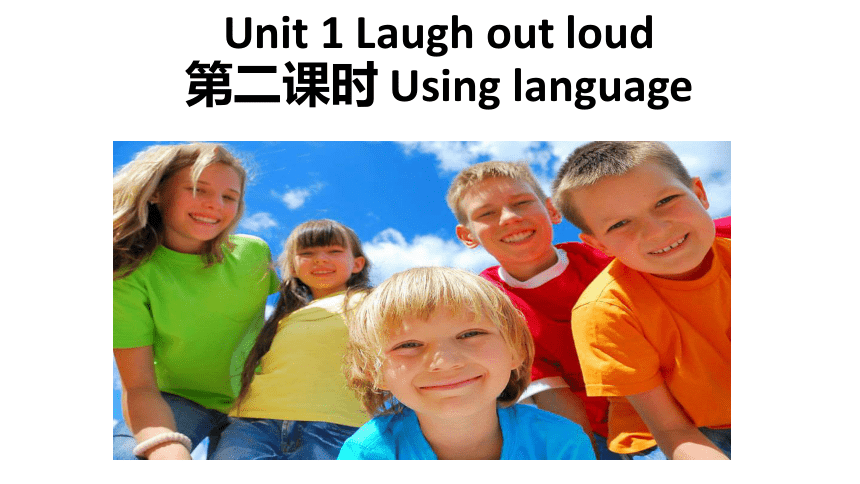 | |
| 格式 | pptx | ||
| 文件大小 | 7.8MB | ||
| 资源类型 | 教案 | ||
| 版本资源 | 外研版(2019) | ||
| 科目 | 英语 | ||
| 更新时间 | 2025-07-12 21:57:15 | ||
图片预览

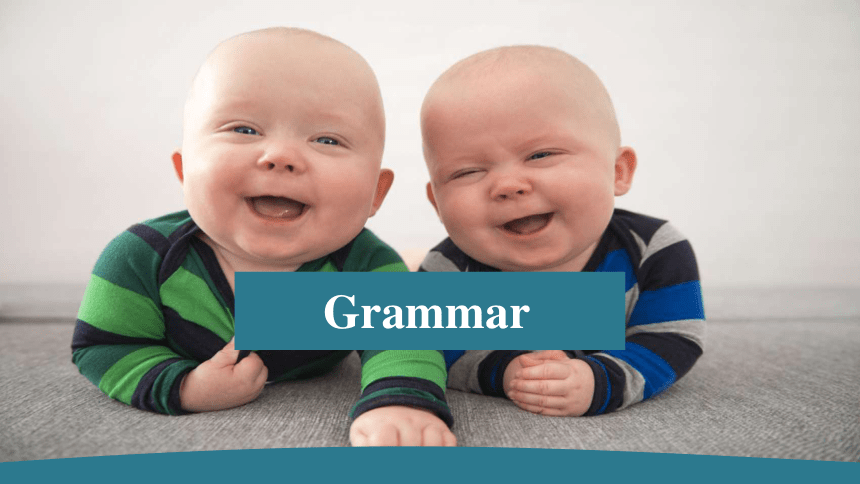
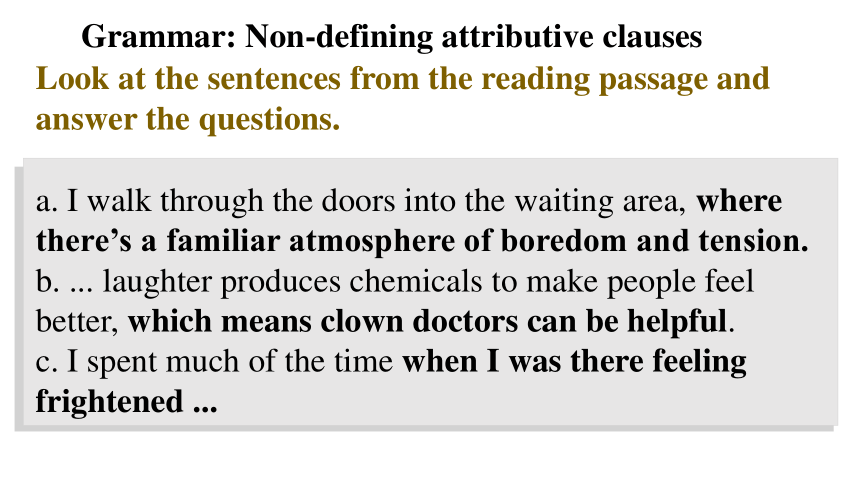
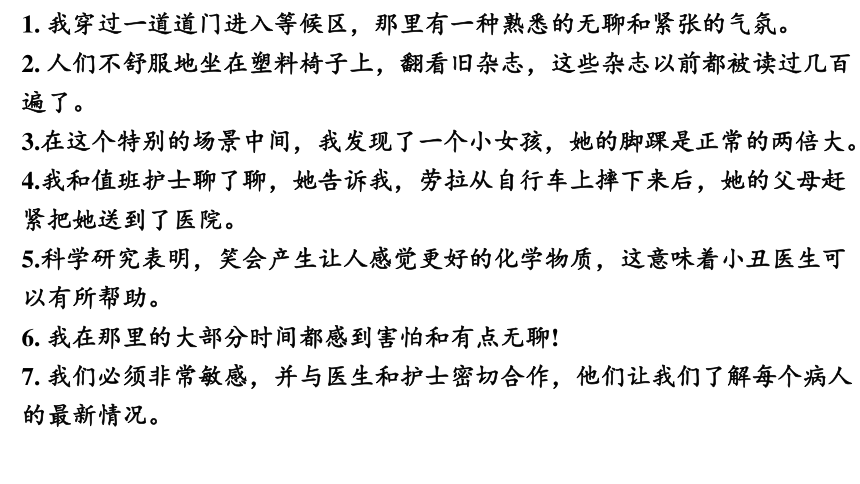
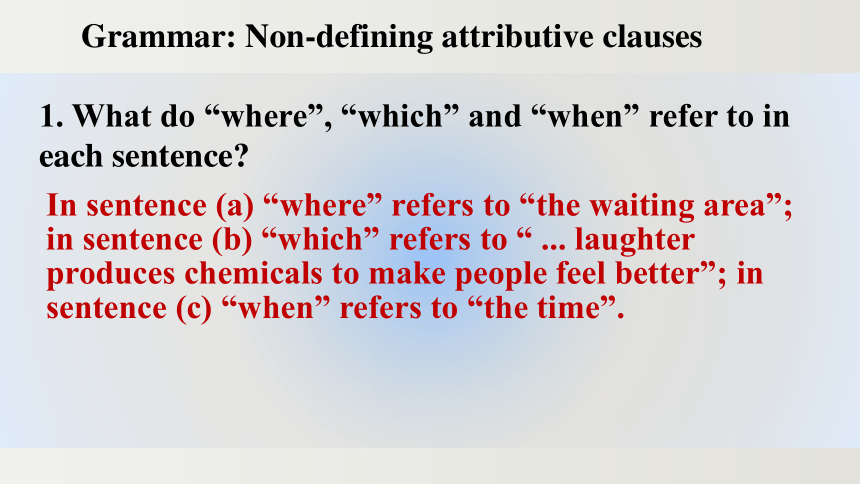
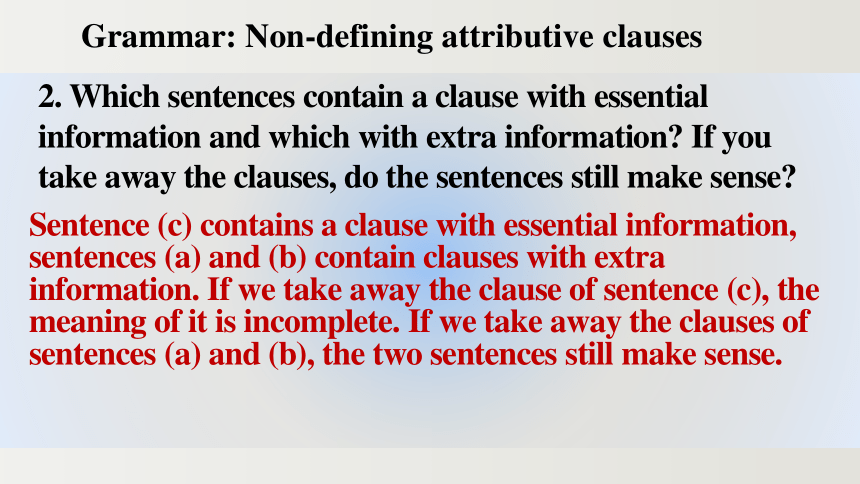
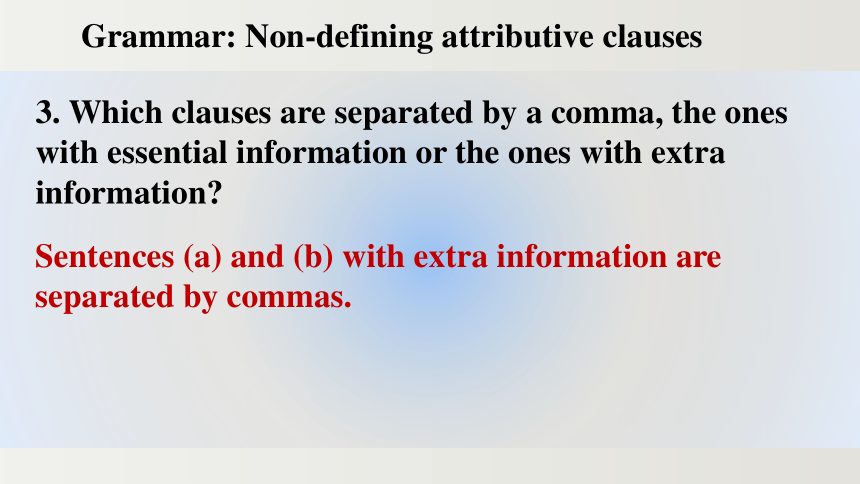
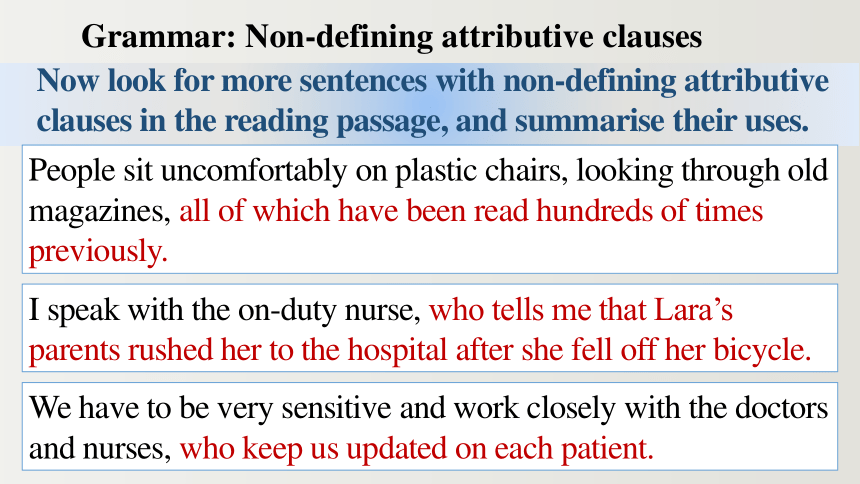
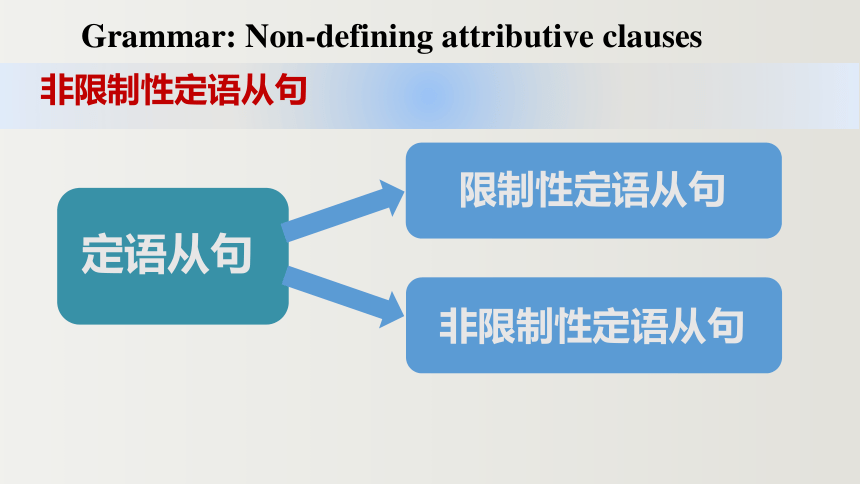
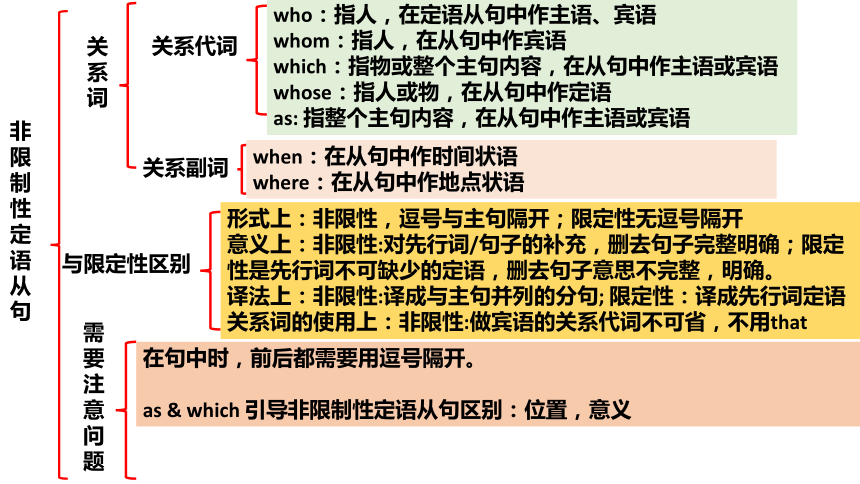
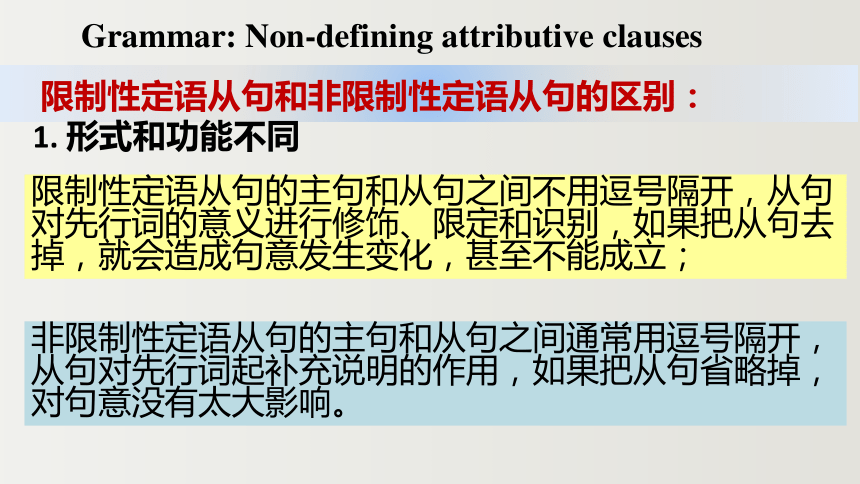
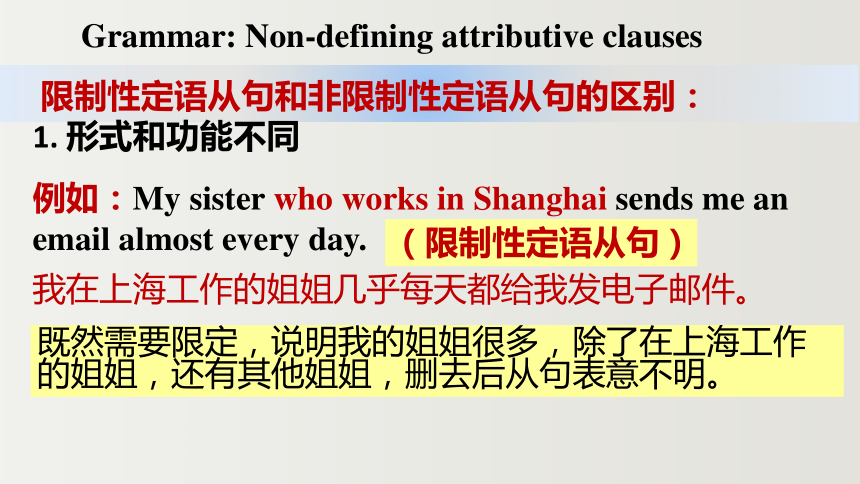
文档简介
(共49张PPT)
Unit 1 Laugh out loud
第二课时 Using language
Grammar
Look at the sentences from the reading passage and answer the questions.
a. I walk through the doors into the waiting area, where there’s a familiar atmosphere of boredom and tension.
b. ... laughter produces chemicals to make people feel
better, which means clown doctors can be helpful.
c. I spent much of the time when I was there feeling
frightened ...
Grammar: Non-defining attributive clauses
1. 我穿过一道道门进入等候区,那里有一种熟悉的无聊和紧张的气氛。
2. 人们不舒服地坐在塑料椅子上,翻看旧杂志,这些杂志以前都被读过几百遍了。
3.在这个特别的场景中间,我发现了一个小女孩,她的脚踝是正常的两倍大。
4.我和值班护士聊了聊,她告诉我,劳拉从自行车上摔下来后,她的父母赶紧把她送到了医院。
5.科学研究表明,笑会产生让人感觉更好的化学物质,这意味着小丑医生可以有所帮助。
6. 我在那里的大部分时间都感到害怕和有点无聊!
7. 我们必须非常敏感,并与医生和护士密切合作,他们让我们了解每个病人的最新情况。
1.当我穿着白大褂走近医院时,我看起来和其他医生一样。
2.人们不舒服地坐在塑料椅子上,翻阅旧杂志,所有这些杂志以前都读过几百遍。
3.自从来到这里,劳拉一直在痛苦中哭泣。
4.我们是经过特殊训练的小丑,是一个被称为“医院小丑”项目的一部分。(用非谓语改造)
5.成为一名小丑医生意味着我可以通过娱乐来帮助人们。
6.我们小丑医生走访医院和其他的医疗保健机构,和医疗专业人员一起工作。
7.看到女儿如此开心,劳拉的父母也更加放松了。
8.虽然劳拉和其他人还需要更多地去医院就诊,但我希望小丑医生能帮助使它成为一个更友好的地方。
In sentence (a) “where” refers to “the waiting area”;
in sentence (b) “which” refers to “ ... laughter produces chemicals to make people feel better”; in sentence (c) “when” refers to “the time”.
1. What do “where”, “which” and “when” refer to in each sentence
Grammar: Non-defining attributive clauses
Grammar: Non-defining attributive clauses
2. Which sentences contain a clause with essential information and which with extra information If you take away the clauses, do the sentences still make sense
Sentence (c) contains a clause with essential information, sentences (a) and (b) contain clauses with extra information. If we take away the clause of sentence (c), the meaning of it is incomplete. If we take away the clauses of sentences (a) and (b), the two sentences still make sense.
Sentences (a) and (b) with extra information are
separated by commas.
3. Which clauses are separated by a comma, the ones with essential information or the ones with extra information
Grammar: Non-defining attributive clauses
Now look for more sentences with non-defining attributive clauses in the reading passage, and summarise their uses.
Grammar: Non-defining attributive clauses
People sit uncomfortably on plastic chairs, looking through old magazines, all of which have been read hundreds of times previously.
I speak with the on-duty nurse, who tells me that Lara’s parents rushed her to the hospital after she fell off her bicycle.
We have to be very sensitive and work closely with the doctors and nurses, who keep us updated on each patient.
非限制性定语从句
Grammar: Non-defining attributive clauses
定语从句
限制性定语从句
非限制性定语从句
非限制性定语从句
关系词
与限定性区别
需要注意问题
关系代词
关系副词
who:指人,在定语从句中作主语、宾语
whom:指人,在从句中作宾语
which:指物或整个主句内容,在从句中作主语或宾语
whose:指人或物,在从句中作定语
as: 指整个主句内容,在从句中作主语或宾语
when:在从句中作时间状语
where:在从句中作地点状语
形式上:非限性,逗号与主句隔开;限定性无逗号隔开
意义上:非限性:对先行词/句子的补充,删去句子完整明确;限定性是先行词不可缺少的定语,删去句子意思不完整,明确。
译法上:非限性:译成与主句并列的分句; 限定性:译成先行词定语
关系词的使用上:非限性:做宾语的关系代词不可省,不用that
在句中时,前后都需要用逗号隔开。
as & which 引导非限制性定语从句区别:位置,意义
限制性定语从句和非限制性定语从句的区别:
Grammar: Non-defining attributive clauses
1. 形式和功能不同
限制性定语从句的主句和从句之间不用逗号隔开,从句对先行词的意义进行修饰、限定和识别,如果把从句去掉,就会造成句意发生变化,甚至不能成立;
非限制性定语从句的主句和从句之间通常用逗号隔开,从句对先行词起补充说明的作用,如果把从句省略掉,对句意没有太大影响。
限制性定语从句和非限制性定语从句的区别:
Grammar: Non-defining attributive clauses
1. 形式和功能不同
例如:My sister who works in Shanghai sends me an email almost every day.
既然需要限定,说明我的姐姐很多,除了在上海工作的姐姐,还有其他姐姐,删去后从句表意不明。
我在上海工作的姐姐几乎每天都给我发电子邮件。
(限制性定语从句)
限制性定语从句和非限制性定语从句的区别:
Grammar: Non-defining attributive clauses
1. 形式和功能不同
例如:My sister, who works in Shanghai, sends me an
email almost every day.
既然不需要限定,说明我只有一个姐姐,删去从句后句意依然明确。
我姐姐在上海工作,几乎每天都给我发电子邮件。
(非限制性定语从句)
限制性定语从句和非限制性定语从句的区别:
Grammar: Non-defining attributive clauses
2. 翻译不同
翻译时,一般把限制性定语从句翻译在它所修饰的先行词之前;
而非限制性定语从句通常与主句分开翻译。
限制性定语从句和非限制性定语从句的区别:
Grammar: Non-defining attributive clauses
2. 翻译不同
例如:He is the man whose car was stolen.
他就是汽车被窃的那个人。
(限制性定语从句)
I’ve invited Mary, who lives in the next flat.
我邀请了Mary,她就住在隔壁。
(非限制性定语从句)
限制性定语从句和非限制性定语从句的区别:
Grammar: Non-defining attributive clauses
3. 先行词不同
限制性定语从句的先行词常常是名词或代词;
非限制性定语从句的先行词可以是名词或代词,也可以是短语或整个句子。
限制性定语从句和非限制性定语从句的区别:
Grammar: Non-defining attributive clauses
3. 先行词不同
例如:Charles Smith, who was my former teacher,
retired last year.
Charles Smith去年退休了,他曾经是我的老师。
(非限制性定语从句)
They rely on themselves, which is much better.
他们依靠自己,这样好得多。
(非限制性定语从句)
先行词是名词
先行词是句子
限制性定语从句和非限制性定语从句的区别:
Grammar: Non-defining attributive clauses
3. 引导词不同
非限制性定语从句一律不能使用______
that
Read the passage and rewrite the tips using non-defining attributive clauses. Add more tips to the list if you can.
Grammar: Non-defining attributive clauses
Achieving a positive state of mind isn’t easy for everyone. But there are ways to maintain a healthy mind even during times of difficulty.
SECRETS TO HAPPINESS
Go for a walk in the countryside. There you can enjoy the beautiful views and a peaceful atmosphere.
Spend time with your family and friends. This will activate chemicals in your brain to make you feel happier.
Try to accept your mistakes. You can learn a lot through them.
Close your eyes and picture the future. You’ve made your dreams come true.
Grammar: Non-defining attributive clauses
Go for a walk in the countryside, where you can enjoy the beautiful views and a peaceful atmosphere.
Go for a walk in the countryside. There you can enjoy the beautiful views and a peaceful atmosphere.
Spend time with your family and friends. This will activate chemicals in your brain to make you feel happier.
Try to accept your mistakes. You can learn a lot through them.
Close your eyes and picture the future. You’ve made your dreams come true.
Grammar: Non-defining attributive clauses
Spend time with your family and friends, which will activate chemicals in your brain to make you feel happier.
Go for a walk in the countryside. There you can enjoy the beautiful views and a peaceful atmosphere.
Spend time with your family and friends. This will activate chemicals in your brain to make you feel happier.
Try to accept your mistakes. You can learn a lot through them.
Close your eyes and picture the future. You’ve made your dreams come true.
Grammar: Non-defining attributive clauses
Try to accept your mistakes, where / through which you can learn a lot.
Go for a walk in the countryside. There you can enjoy the beautiful views and a peaceful atmosphere.
Spend time with your family and friends. This will activate chemicals in your brain to make you feel happier.
Try to accept your mistakes. You can learn a lot through them.
Close your eyes and picture the future. You’ve made your dreams come true.
Grammar: Non-defining attributive clauses
Close your eyes and picture the future, where / in wchich you’ve made your dreams come true.
Go for a walk in the countryside. There you can enjoy the beautiful views and a peaceful atmosphere.
Spend time with your family and friends. This will activate chemicals in your brain to make you feel happier.
Try to accept your mistakes. You can learn a lot through them.
Close your eyes and picture the future. You’ve made your dreams come true.
Grammar: Non-defining attributive clauses
has lost his patience by now
he thinks will impress Holmes
is lying next to him
he finds annoying
Complete the joke with the sentence parts in the box using who / which and put commas in the correct position.
Grammar: Non-defining attributive clauses
One day, Sherlock Holmes and Dr Watson go camping. They put up their tent under the stars and go to sleep. Suddenly, in the middle of the night, Watson is woken up by Holmes, 1 ______________________ “Watson,” Holmes says, “look up at the stars, and tell me what they tell you.” Not quite sure what he means, Watson thinks Holmes is joking , 2 ______________________ at this time of night.
who is lying next to him
which he finds annoying
Grammar: Non-defining attributive clauses
Even so, he replies, “I see millions of stars and it’s quite likely there are some planets like Earth. And if so, this means that there might also be life on other planets.” Watson is pleased with his answer, 3 ________________________________. But Holmes, 4 ____________________________ shouts, “Watson, look around you! Use your eyes! Somebody’s stolen our tent!”
who has lost his patience by now
which he thinks will impress Holmes
essential
extra
make sense
separate
获得积极的心态并不是对每个人都很容易。
不确定他什么意思,华生以为福尔摩斯在开玩笑,他觉得晚上这个时候开玩笑太烦人了。
宁静的氛围
想象未来
去宿营
搭建帐篷
在半夜
抬头看星星
发现...很烦人
尽管如此
对...满意
失去耐心
到现在为主
环顾四周
偷窃
教材原句p.6 If you take away the clauses,do the sentences still make sense 如果去掉从句,这些句子还有意义吗?
make sense 有意义;有道理;是明智的,是合乎情理的
搭配:It makes sense to do sth. 做某事是明智的。
I think it makes sense to make full preparations before the interview. 我认为面试前做好充分的准备是明智的。
【归纳拓展】
make sense of sth. 理解某事,弄懂某事
make no sense 没有道理,没有意义
Fun Time
Listen and complete the conversations.(P7)
Fun time
1. ear to ear
2. head off
Check the answers
smile/grin/beam from ear to ear 眉开眼笑;
笑得合不拢嘴
laugh one’s head off 大笑不止;狂笑不已
Check the answers
3. smiles
be all smiles = be very happy / friendly一脸笑意;喜滋滋的
4. laughing
5. a smile
Check the answers
laughing stock 笑柄;笑料
crack a smile 露出笑脸
Activity 6 Match the expressions you have completed in Activity 5 to their meanings.
laughing stock
grin from ear to ear
be all smiles
crack a smile
laugh one's head off
与笑有关的短语:
burst out laughing 放声大笑 burst into laughter
have /get the last laugh 笑到最后,取得最后的胜利
He who laughs last, laughs best. 笑到最后的人笑的最开心。
can’t help laughing忍不住大笑
giggle 咯咯笑,傻笑 laugh foolishly 傻笑
smile at 朝某人笑
smile bitterly 苦笑
force a smile 强颜欢笑 with a forced smile
tease, make fun of 取笑
wear a big smile on one's face 笑容满面
laugh till the tears roll down one's cheeks /laugh with tears rolling down one's cheeks 笑出眼泪
Work in groups and think of more expressions about laughter.
哈哈大笑
放声大笑
忍不住大笑
为了取乐;作为消遣
笑到最后
笑到最后的人笑得最
开心。
a good laugh
burst out laughing
fall about laughing
for laughs
have / get the last laugh
He who laughs last, laughs best.
giggle; laugh foolishly; simper
grin
smile at sb
smile bitterly
smirk
snicker; laugh up one’s sleeve
tease; make fun of
Work in groups and think of more expressions about laughter.
傻笑
咧着嘴笑
朝某人微笑
苦笑
幸灾乐祸地笑
窃笑
取笑
教材原句p.7 We all deserve a second chance,I guess. 我想我们都应该再有一次机会。
deserve v. 应得,应受到
deserve to do sth. 值得做某事,应该做某事
deserve doing/to be done 值得被做
The report deserves careful consideration. 这篇报告应该给予认真考虑。
They certainly deserved to win that game. 他们当然应该赢得那场比赛。
He deserved punishing/to be punished. 他应受惩罚。
搭配
Discuss other situations in which you could use these expressions.
You may start like this:
A: Tom must have passed that
really hard test.
B: Why do you think so
A: Because he was grinning
from ear to ear yesterday
when I met him.
Pair work
Listening & speaking
Did you know
April Fool’s Day is on 1 April. It’s the one day of the year when people in many parts of the world play practical jokes on each other. Even newspapers, radio and TV stations play tricks on their readers and audiences. The jokes traditionally last until noon in the UK. But in some other countries, such as the US, they can last all day!
Listen to the radio programme and choose the pictures mentioned.(P7)
Listen again and complete the notes(P7).
Listening & speaking: While-listening
Listen again and complete the notes.
Joke 1
Year: 1698
Main story: A newsletter reported people going to watch 1 _______________________ at the Tower of London. The joke was played on visitors throughout the 2 _______________________.
“the washing of the lions”
18th and 19th centuries
Listening & speaking: While-listening
Listen again and complete the notes.
Joke 2
Year: 3 _____________
Main story: The 4 __________________ introduced an invention called “Smellovision”. It allowed 5 __________________ over the airwaves.
smells to be carried
BBC News Channel
1965
Listening & speaking: While-listening
Listen again and complete the notes.
Joke 3
Year: 6 ____________
Main story: A news programme told viewers that the spaghetti trees in Switzerland were having 7 ______________________.
a really good harvest
1957
Telling a story Making comments
Let’s start with ...
That’s so funny!
It’s a good one!
Now, my favourite one ...
I can imagine!
I don’t get it.
Complete the boxes with expressions from the radio programme(P9).
Pair work
Tell each other a funny story and make comments using the expressions in this section.
Unit 1 Laugh out loud
第二课时 Using language
Grammar
Look at the sentences from the reading passage and answer the questions.
a. I walk through the doors into the waiting area, where there’s a familiar atmosphere of boredom and tension.
b. ... laughter produces chemicals to make people feel
better, which means clown doctors can be helpful.
c. I spent much of the time when I was there feeling
frightened ...
Grammar: Non-defining attributive clauses
1. 我穿过一道道门进入等候区,那里有一种熟悉的无聊和紧张的气氛。
2. 人们不舒服地坐在塑料椅子上,翻看旧杂志,这些杂志以前都被读过几百遍了。
3.在这个特别的场景中间,我发现了一个小女孩,她的脚踝是正常的两倍大。
4.我和值班护士聊了聊,她告诉我,劳拉从自行车上摔下来后,她的父母赶紧把她送到了医院。
5.科学研究表明,笑会产生让人感觉更好的化学物质,这意味着小丑医生可以有所帮助。
6. 我在那里的大部分时间都感到害怕和有点无聊!
7. 我们必须非常敏感,并与医生和护士密切合作,他们让我们了解每个病人的最新情况。
1.当我穿着白大褂走近医院时,我看起来和其他医生一样。
2.人们不舒服地坐在塑料椅子上,翻阅旧杂志,所有这些杂志以前都读过几百遍。
3.自从来到这里,劳拉一直在痛苦中哭泣。
4.我们是经过特殊训练的小丑,是一个被称为“医院小丑”项目的一部分。(用非谓语改造)
5.成为一名小丑医生意味着我可以通过娱乐来帮助人们。
6.我们小丑医生走访医院和其他的医疗保健机构,和医疗专业人员一起工作。
7.看到女儿如此开心,劳拉的父母也更加放松了。
8.虽然劳拉和其他人还需要更多地去医院就诊,但我希望小丑医生能帮助使它成为一个更友好的地方。
In sentence (a) “where” refers to “the waiting area”;
in sentence (b) “which” refers to “ ... laughter produces chemicals to make people feel better”; in sentence (c) “when” refers to “the time”.
1. What do “where”, “which” and “when” refer to in each sentence
Grammar: Non-defining attributive clauses
Grammar: Non-defining attributive clauses
2. Which sentences contain a clause with essential information and which with extra information If you take away the clauses, do the sentences still make sense
Sentence (c) contains a clause with essential information, sentences (a) and (b) contain clauses with extra information. If we take away the clause of sentence (c), the meaning of it is incomplete. If we take away the clauses of sentences (a) and (b), the two sentences still make sense.
Sentences (a) and (b) with extra information are
separated by commas.
3. Which clauses are separated by a comma, the ones with essential information or the ones with extra information
Grammar: Non-defining attributive clauses
Now look for more sentences with non-defining attributive clauses in the reading passage, and summarise their uses.
Grammar: Non-defining attributive clauses
People sit uncomfortably on plastic chairs, looking through old magazines, all of which have been read hundreds of times previously.
I speak with the on-duty nurse, who tells me that Lara’s parents rushed her to the hospital after she fell off her bicycle.
We have to be very sensitive and work closely with the doctors and nurses, who keep us updated on each patient.
非限制性定语从句
Grammar: Non-defining attributive clauses
定语从句
限制性定语从句
非限制性定语从句
非限制性定语从句
关系词
与限定性区别
需要注意问题
关系代词
关系副词
who:指人,在定语从句中作主语、宾语
whom:指人,在从句中作宾语
which:指物或整个主句内容,在从句中作主语或宾语
whose:指人或物,在从句中作定语
as: 指整个主句内容,在从句中作主语或宾语
when:在从句中作时间状语
where:在从句中作地点状语
形式上:非限性,逗号与主句隔开;限定性无逗号隔开
意义上:非限性:对先行词/句子的补充,删去句子完整明确;限定性是先行词不可缺少的定语,删去句子意思不完整,明确。
译法上:非限性:译成与主句并列的分句; 限定性:译成先行词定语
关系词的使用上:非限性:做宾语的关系代词不可省,不用that
在句中时,前后都需要用逗号隔开。
as & which 引导非限制性定语从句区别:位置,意义
限制性定语从句和非限制性定语从句的区别:
Grammar: Non-defining attributive clauses
1. 形式和功能不同
限制性定语从句的主句和从句之间不用逗号隔开,从句对先行词的意义进行修饰、限定和识别,如果把从句去掉,就会造成句意发生变化,甚至不能成立;
非限制性定语从句的主句和从句之间通常用逗号隔开,从句对先行词起补充说明的作用,如果把从句省略掉,对句意没有太大影响。
限制性定语从句和非限制性定语从句的区别:
Grammar: Non-defining attributive clauses
1. 形式和功能不同
例如:My sister who works in Shanghai sends me an email almost every day.
既然需要限定,说明我的姐姐很多,除了在上海工作的姐姐,还有其他姐姐,删去后从句表意不明。
我在上海工作的姐姐几乎每天都给我发电子邮件。
(限制性定语从句)
限制性定语从句和非限制性定语从句的区别:
Grammar: Non-defining attributive clauses
1. 形式和功能不同
例如:My sister, who works in Shanghai, sends me an
email almost every day.
既然不需要限定,说明我只有一个姐姐,删去从句后句意依然明确。
我姐姐在上海工作,几乎每天都给我发电子邮件。
(非限制性定语从句)
限制性定语从句和非限制性定语从句的区别:
Grammar: Non-defining attributive clauses
2. 翻译不同
翻译时,一般把限制性定语从句翻译在它所修饰的先行词之前;
而非限制性定语从句通常与主句分开翻译。
限制性定语从句和非限制性定语从句的区别:
Grammar: Non-defining attributive clauses
2. 翻译不同
例如:He is the man whose car was stolen.
他就是汽车被窃的那个人。
(限制性定语从句)
I’ve invited Mary, who lives in the next flat.
我邀请了Mary,她就住在隔壁。
(非限制性定语从句)
限制性定语从句和非限制性定语从句的区别:
Grammar: Non-defining attributive clauses
3. 先行词不同
限制性定语从句的先行词常常是名词或代词;
非限制性定语从句的先行词可以是名词或代词,也可以是短语或整个句子。
限制性定语从句和非限制性定语从句的区别:
Grammar: Non-defining attributive clauses
3. 先行词不同
例如:Charles Smith, who was my former teacher,
retired last year.
Charles Smith去年退休了,他曾经是我的老师。
(非限制性定语从句)
They rely on themselves, which is much better.
他们依靠自己,这样好得多。
(非限制性定语从句)
先行词是名词
先行词是句子
限制性定语从句和非限制性定语从句的区别:
Grammar: Non-defining attributive clauses
3. 引导词不同
非限制性定语从句一律不能使用______
that
Read the passage and rewrite the tips using non-defining attributive clauses. Add more tips to the list if you can.
Grammar: Non-defining attributive clauses
Achieving a positive state of mind isn’t easy for everyone. But there are ways to maintain a healthy mind even during times of difficulty.
SECRETS TO HAPPINESS
Go for a walk in the countryside. There you can enjoy the beautiful views and a peaceful atmosphere.
Spend time with your family and friends. This will activate chemicals in your brain to make you feel happier.
Try to accept your mistakes. You can learn a lot through them.
Close your eyes and picture the future. You’ve made your dreams come true.
Grammar: Non-defining attributive clauses
Go for a walk in the countryside, where you can enjoy the beautiful views and a peaceful atmosphere.
Go for a walk in the countryside. There you can enjoy the beautiful views and a peaceful atmosphere.
Spend time with your family and friends. This will activate chemicals in your brain to make you feel happier.
Try to accept your mistakes. You can learn a lot through them.
Close your eyes and picture the future. You’ve made your dreams come true.
Grammar: Non-defining attributive clauses
Spend time with your family and friends, which will activate chemicals in your brain to make you feel happier.
Go for a walk in the countryside. There you can enjoy the beautiful views and a peaceful atmosphere.
Spend time with your family and friends. This will activate chemicals in your brain to make you feel happier.
Try to accept your mistakes. You can learn a lot through them.
Close your eyes and picture the future. You’ve made your dreams come true.
Grammar: Non-defining attributive clauses
Try to accept your mistakes, where / through which you can learn a lot.
Go for a walk in the countryside. There you can enjoy the beautiful views and a peaceful atmosphere.
Spend time with your family and friends. This will activate chemicals in your brain to make you feel happier.
Try to accept your mistakes. You can learn a lot through them.
Close your eyes and picture the future. You’ve made your dreams come true.
Grammar: Non-defining attributive clauses
Close your eyes and picture the future, where / in wchich you’ve made your dreams come true.
Go for a walk in the countryside. There you can enjoy the beautiful views and a peaceful atmosphere.
Spend time with your family and friends. This will activate chemicals in your brain to make you feel happier.
Try to accept your mistakes. You can learn a lot through them.
Close your eyes and picture the future. You’ve made your dreams come true.
Grammar: Non-defining attributive clauses
has lost his patience by now
he thinks will impress Holmes
is lying next to him
he finds annoying
Complete the joke with the sentence parts in the box using who / which and put commas in the correct position.
Grammar: Non-defining attributive clauses
One day, Sherlock Holmes and Dr Watson go camping. They put up their tent under the stars and go to sleep. Suddenly, in the middle of the night, Watson is woken up by Holmes, 1 ______________________ “Watson,” Holmes says, “look up at the stars, and tell me what they tell you.” Not quite sure what he means, Watson thinks Holmes is joking , 2 ______________________ at this time of night.
who is lying next to him
which he finds annoying
Grammar: Non-defining attributive clauses
Even so, he replies, “I see millions of stars and it’s quite likely there are some planets like Earth. And if so, this means that there might also be life on other planets.” Watson is pleased with his answer, 3 ________________________________. But Holmes, 4 ____________________________ shouts, “Watson, look around you! Use your eyes! Somebody’s stolen our tent!”
who has lost his patience by now
which he thinks will impress Holmes
essential
extra
make sense
separate
获得积极的心态并不是对每个人都很容易。
不确定他什么意思,华生以为福尔摩斯在开玩笑,他觉得晚上这个时候开玩笑太烦人了。
宁静的氛围
想象未来
去宿营
搭建帐篷
在半夜
抬头看星星
发现...很烦人
尽管如此
对...满意
失去耐心
到现在为主
环顾四周
偷窃
教材原句p.6 If you take away the clauses,do the sentences still make sense 如果去掉从句,这些句子还有意义吗?
make sense 有意义;有道理;是明智的,是合乎情理的
搭配:It makes sense to do sth. 做某事是明智的。
I think it makes sense to make full preparations before the interview. 我认为面试前做好充分的准备是明智的。
【归纳拓展】
make sense of sth. 理解某事,弄懂某事
make no sense 没有道理,没有意义
Fun Time
Listen and complete the conversations.(P7)
Fun time
1. ear to ear
2. head off
Check the answers
smile/grin/beam from ear to ear 眉开眼笑;
笑得合不拢嘴
laugh one’s head off 大笑不止;狂笑不已
Check the answers
3. smiles
be all smiles = be very happy / friendly一脸笑意;喜滋滋的
4. laughing
5. a smile
Check the answers
laughing stock 笑柄;笑料
crack a smile 露出笑脸
Activity 6 Match the expressions you have completed in Activity 5 to their meanings.
laughing stock
grin from ear to ear
be all smiles
crack a smile
laugh one's head off
与笑有关的短语:
burst out laughing 放声大笑 burst into laughter
have /get the last laugh 笑到最后,取得最后的胜利
He who laughs last, laughs best. 笑到最后的人笑的最开心。
can’t help laughing忍不住大笑
giggle 咯咯笑,傻笑 laugh foolishly 傻笑
smile at 朝某人笑
smile bitterly 苦笑
force a smile 强颜欢笑 with a forced smile
tease, make fun of 取笑
wear a big smile on one's face 笑容满面
laugh till the tears roll down one's cheeks /laugh with tears rolling down one's cheeks 笑出眼泪
Work in groups and think of more expressions about laughter.
哈哈大笑
放声大笑
忍不住大笑
为了取乐;作为消遣
笑到最后
笑到最后的人笑得最
开心。
a good laugh
burst out laughing
fall about laughing
for laughs
have / get the last laugh
He who laughs last, laughs best.
giggle; laugh foolishly; simper
grin
smile at sb
smile bitterly
smirk
snicker; laugh up one’s sleeve
tease; make fun of
Work in groups and think of more expressions about laughter.
傻笑
咧着嘴笑
朝某人微笑
苦笑
幸灾乐祸地笑
窃笑
取笑
教材原句p.7 We all deserve a second chance,I guess. 我想我们都应该再有一次机会。
deserve v. 应得,应受到
deserve to do sth. 值得做某事,应该做某事
deserve doing/to be done 值得被做
The report deserves careful consideration. 这篇报告应该给予认真考虑。
They certainly deserved to win that game. 他们当然应该赢得那场比赛。
He deserved punishing/to be punished. 他应受惩罚。
搭配
Discuss other situations in which you could use these expressions.
You may start like this:
A: Tom must have passed that
really hard test.
B: Why do you think so
A: Because he was grinning
from ear to ear yesterday
when I met him.
Pair work
Listening & speaking
Did you know
April Fool’s Day is on 1 April. It’s the one day of the year when people in many parts of the world play practical jokes on each other. Even newspapers, radio and TV stations play tricks on their readers and audiences. The jokes traditionally last until noon in the UK. But in some other countries, such as the US, they can last all day!
Listen to the radio programme and choose the pictures mentioned.(P7)
Listen again and complete the notes(P7).
Listening & speaking: While-listening
Listen again and complete the notes.
Joke 1
Year: 1698
Main story: A newsletter reported people going to watch 1 _______________________ at the Tower of London. The joke was played on visitors throughout the 2 _______________________.
“the washing of the lions”
18th and 19th centuries
Listening & speaking: While-listening
Listen again and complete the notes.
Joke 2
Year: 3 _____________
Main story: The 4 __________________ introduced an invention called “Smellovision”. It allowed 5 __________________ over the airwaves.
smells to be carried
BBC News Channel
1965
Listening & speaking: While-listening
Listen again and complete the notes.
Joke 3
Year: 6 ____________
Main story: A news programme told viewers that the spaghetti trees in Switzerland were having 7 ______________________.
a really good harvest
1957
Telling a story Making comments
Let’s start with ...
That’s so funny!
It’s a good one!
Now, my favourite one ...
I can imagine!
I don’t get it.
Complete the boxes with expressions from the radio programme(P9).
Pair work
Tell each other a funny story and make comments using the expressions in this section.
